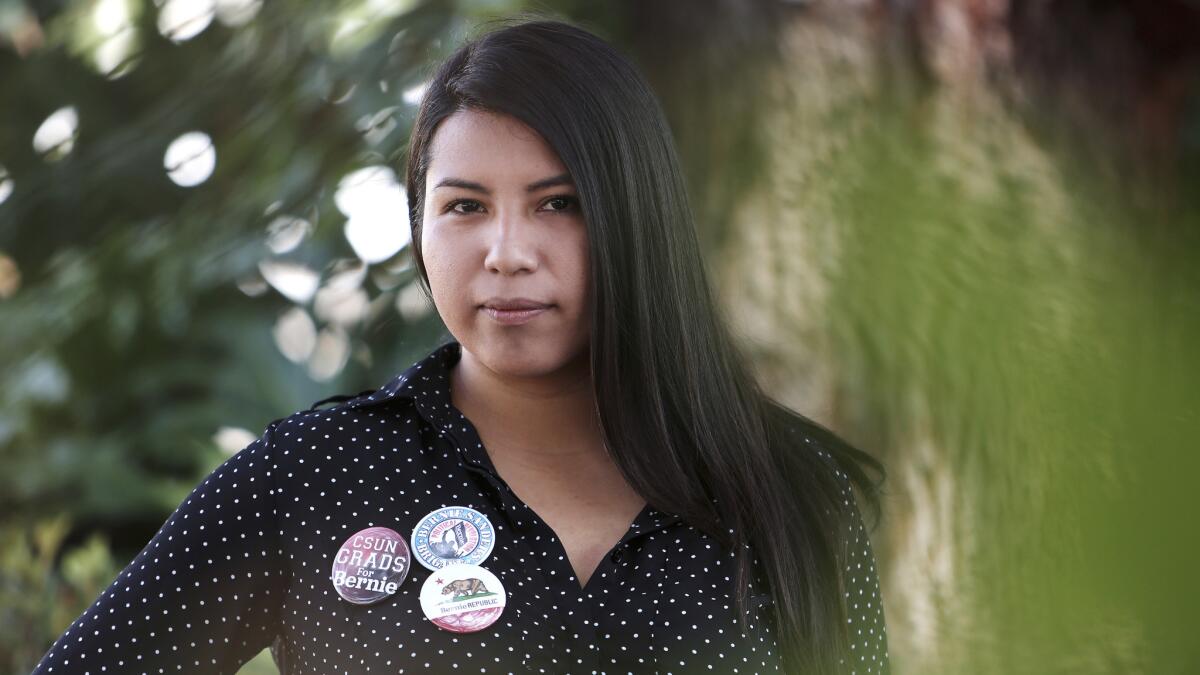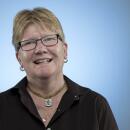Many Bernie Sanders delegates are new to the Democratic Party

- Share via
Many of California’s Democratic delegates backing second-place finisher Bernie Sanders share a notable trait with their candidate — they are new converts to the party.
About one in three is a recently registered Democrat, according to a Los Angeles Times analysis of the state party delegation.
Jonathan Holt, 53, was previously a Republican and a “no party preference” voter. He changed his party affiliation and registered as a Democrat to support Sanders. For the last two decades, he said, he wrote in “dead yellow dog” on his ballot instead of selecting a candidate.
“I just got thoroughly disgusted with both Republicans and Democrats, so I became what you would consider a protest voter,” said Holt, a teacher’s aide who lives in an unincorporated part of Lake County.
Now, Holt is among the more than 200 Californians — about 11% of Sanders’ roughly 1,900 delegates — who will attend the Democratic National Convention in Philadelphia this month. Their goals are to push the party’s platform to the left, overhaul how the party picks its nominee and win the nomination for Sanders.
Despite their resolve, the Vermont senator will not leave the convention as the nominee. Former Secretary of State Hillary Clinton won more votes, more delegates and more states than Sanders, and clinched the party’s nomination in early June with the inclusion of superdelegates — elected officials and party leaders who are unbound and can vote their will.
Traditionally, delegates tend to be longtime loyalists — politicians, activists and donors. Clinton’s delegate roster is a who’s who of Democratic insiders. In California, it includes former Gov. Gray Davis, former Los Angeles Mayor Antonio Villaraigosa, Compton Mayor Aja Brown, celebrity attorney Gloria Allred and many state and local elected officials. About one in 10 of her California delegates recently registered as Democrats, according to The Times analysis.
Sanders has far fewer boldface names — the most prominent are actresses Rosario Dawson and Shailene Woodley, and RoseAnn DeMoro, the head of the National Nurses United labor group. More than 70 of his delegates either switched their party registration or registered as Democrats in the past year after he launched his bid, according to The Times analysis.
Among them is Noemi Tungui, 23, who registered in May so she could support Sanders in California’s June primary. She immigrated legally to the United States from Mexico as a 3-year-old, but didn’t apply for citizenship until last fall.
“I originally applied to be a citizen because of Bernie, so I could be able to vote for him,” said the Cal State Northridge student, who is majoring in psychology and political science. “I’m fighting next to Bernie. He’s fighting as a Democrat, so I’ll stand as a Democrat.”
In April 2015, when Sanders filed his statement of candidacy, he declared that his party affiliation was with the Democratic Party. But throughout his political life, Sanders has identified as an independent and a democratic socialist. He has regularly expressed disdain for both major political parties — in 1989 he labeled them “Tweedledee” and “Tweedledum” — though he frequently voted with Democrats in Washington. During his presidential campaign, he sharply challenged the party’s establishment.
Tungui said her allegiance is with Sanders’ ideals — notably tuition-free public college, equal pay and healthcare for all — not with the party.
“At this point, I feel like no party really represents me,” she said. “I wouldn’t want to be placed in a party, just because there’s corruption in the whole political system. So I’m not sure how I’ll be registered next election time, or even in November.”
I’m not sure how I’ll be registered next election time, or even in November.
— Bernie Sanders delegate Noemi Tungui, 23
A critical question for the Democratic Party is whether it can capture the energy and affection of voters such as Tungui, or whether a rift will grow, leading to a movement like the tea party, which has weakened the GOP establishment.
DeMoro, the nurses union chief, said the rise of a third party was inevitable if the Democratic Party did not heed Sanders’ supporters concerns.
“The Democrats either have to change or die,” she said.
Party officials are hoping to bring Sanders’ supporters into the fold.
“Philadelphia shouldn’t be the end of the journey, it should really be a launching pad for people to work for progressive change in their own communities,” said Michael Soller, spokesman for the California Democratic Party.
Soller pointed to the state Democrats’ platform, which is more liberal than the national party’s on issues that Sanders has prioritized, such as universal healthcare and fracking.
“We stand for a lot of the things those delegates want to see,” he said. “Look, those are our values, let’s go fight for them together.”
Charles Chamberlain, executive director of Democracy for America, said party officials needed to show respect and patience with the delegates, and not take the inevitable disagreements personally, to ensure Sanders’ supporters turn out in November.
“If the political revolution is not embraced by the party, I’m not worried about them voting for [presumptive GOP nominee Donald] Trump. I am worried about them staying home,” said Chamberlain, whose group was founded by former Vermont Gov. Howard Dean in 2004 to harness the progressive momentum from his unsuccessful presidential bid. “The Democratic Party establishment needs to use the convention to make clear to the political revolution: We don’t just want you to have a seat at the table, we want to hear your voice and we want you to be a part of this party.”
Some Sanders supporters say they are skeptical.
“I definitely think that those who have the most power today in the Democratic Party see us as a nuisance, and at the local level, most of the time we’re insulted or ignored,” said Joseph Aszterbaum, a former member of the Peace and Freedom Party who recently registered as a Democrat.
The 41-year-old Sanders delegate from Hemet said he saw Sanders’ candidacy as a return to the Democratic Party’s ideals during the period between the presidencies of Franklin Roosevelt and Jimmy Carter, and a repudiation of the centrist tack taken during President Bill Clinton’s tenure in the 1990s.
Several delegates said they would decide whether to try to change the party from within based on Sanders’ next moves. Since it became clear that Clinton would be the nominee, Sanders has delayed endorsing her as he seeks platform concessions and a speaking slot at the convention. He is expected to endorse her next week in a joint appearance in New Hampshire.
“I support Sen. Sanders and I’ll be taking my cues from him on that,” said Michael Wilson, 55, an Ontario translator who was a Republican and a no party preference voter before joining the Democratic Party in February. “I’d like to make the Democratic Party into a vital, vibrant, truly representative legitimate party in politics again. I’d like to see that happen, but I’m not totally convinced it can happen.”
Times staff writer Ben Welsh contributed to this report.
More to Read
Get the L.A. Times Politics newsletter
Deeply reported insights into legislation, politics and policy from Sacramento, Washington and beyond. In your inbox twice per week.
You may occasionally receive promotional content from the Los Angeles Times.












